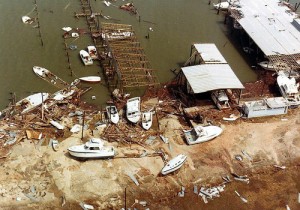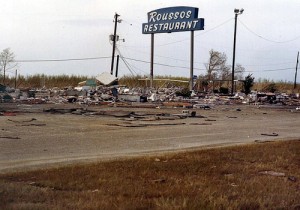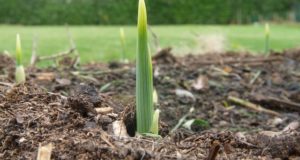 We lived on the Mississippi coastline when Hurricane Frederic came through in 1979. Although we had everything we needed, my husband thought we should pick up a few more batteries, just in case. When we got to the store, there was a line over a hundred feet long just to get into the store. When I looked through the window to see what it was like inside, I wondered why the people were in line since all the shelves I could see were empty.
We lived on the Mississippi coastline when Hurricane Frederic came through in 1979. Although we had everything we needed, my husband thought we should pick up a few more batteries, just in case. When we got to the store, there was a line over a hundred feet long just to get into the store. When I looked through the window to see what it was like inside, I wondered why the people were in line since all the shelves I could see were empty.
We went home and pushed all our furniture and goods into a tall pile into the living room, taped our windows, and put rolled up towels on the floor by all the doors. My husband was in the Air Force and was ordered to evacuate our home, so we took our kids, the Grab and Go kit, along with sleeping bags and blankets to the designated shelter, a large building on Keesler Air Force Base. We were directed to a large classroom where all of the desks had been removed and, along with a lot of other families,laid out our sleeping bags on the floor. It was noisy and crowded, but we had food, water, flashlights, radio, and some books and games for the kids. As I looked around at what other people had, I realized that most did not have the things we did.
Radios were turned on, tracking the hurricane. People talked nervously, and children cried so it was not easy to sleep. I walked through the hallways several times that night, trying to comfort my crying baby. On one of my walks I witnessed a scene I’ll never forget. There were six or seven men standing around a vending machine in the hallway. The lights to the machine were on, but it was completely empty. Not even a package of gum remained. The men just stood there with their hands in their pockets, staring at the empty vending machine, saying nothing.
About midnight I walked the halls again. The power was still on, but several radio stations had gone off the air. I walked to the front doors and looked out. The wind howled and the parking lot lights showed the rain blowing sideways. With my baby finally asleep, I went back to my little family area and tried to get some rest in spite of the noisy people, radios, and kids crying. I wished I had earplugs to cut out some of the noise, but had to manage without them. Pure exhaustion took over and somehow I slept a little. [We made a point of adding earplugs to our kits later on so we would be better prepared if we had to evacuate to a shelter in the future.]
When I woke up a little later, the hallway lights were off as our power was out. We soon discovered that part of the roof had blown off our building and people from the second floor had to evacuate into the rooms on the first floor. Water was coming down the wall in our room and soaking the sleeping bags of the people next to it. They all moved to a dry area but everything they had was wet, so we donated our blankets to them since we had our sleeping bags. It was a long, miserable night with very little sleep.
When morning came we walked out into a bright sunny day and marveled at the changes that had taken place. At least half the trees were down, many blocking roads. Some had landed on cars, but ours was undamaged. Many buildings were damaged in addition to the one in which we sheltered. We managed to drive home, only to find trees were down everywhere in our neighborhood. However, except for some water under our back door, everything in our house was just as we had left it. We mopped up the water, put our things back in place and got out our camping gear.
There was no power or water, so for the next few days we camped inside our house. We had flashlights and a lantern, a camp stove and fuel, and we had plenty of food. We had a bathtub full of water we used with the toilet but didn’t use it for drinking as it was contaminated. We used water from our storage to drink and cook with – it was three days before we got potable water and electricity again. We were lucky. We lived in the section where the base commander lived and were the first to get power restored. Most didn’t get power and water for well over a week, and some for more than a month.

A restaurant destroyed by Hurricane Frederic.
Without power folks with freezers couldn’t keep things cold. Soon the thawing meat was slapped on barbecues to cook before it could spoil. Neighbors shared their meat as it was more than they could cook and eat alone. Even with this, food quickly ran out and there were many hungry people. Food was flown into the area and cafeterias were set up until power was restored, which in some areas was more than a month.
Stores that still had merchandise couldn’t open because they needed power to run things. Gas stations couldn’t pump gas and the nights were very dark without street lights. As power was slowly restored and stores started to open up again for business, there were long lines of people everywhere but nothing much to sell. It took time to get inventory in to restock the store shelves. Until then, people had to make do with what they had or rely on someone else for help.
We helped many people, but there was no way we could help everyone. I was surprised that so few people had prepared when they knew they lived in a hurricane-prone area. The preparations that were made came when the news stated that a hurricane was going to hit. Only then did people start thinking about what they would need and running to the stores to get those things. Hence the stripped shelves when we went to pick up a few extra batteries.
What a difference our experience was compared to the chaos of the people around us. Our preparations took most of the fear out of a scary situation. Because we were prepared, the changes for us were novel and seemed like a vacation. The kids actually thought it was fun!
Nola P.
Other articles in this issue:
If you liked this article you may be interested in this product from our sponsor.

 Off The Grid News Better Ideas For Off The Grid Living
Off The Grid News Better Ideas For Off The Grid Living



